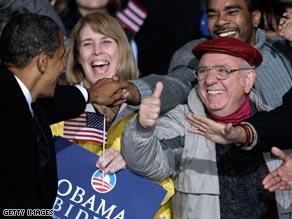VIRGINIA BEACH, Virginia (CNN) -- Barack Obama loves Virginia. Thursday's rally at Virginia Beach was his 10th visit to the state since he won the Democratic presidential nomination and his third in a little over a week.

Obama greets supporters in Virginia Beach.
And on Friday the Obama camp announced that he will end his campaign with a final rally at Manassas Park n the north of the state.
From the suburbs of Washington D.C. to the seaports of Hampton Roads, Virginia is abuzz with pre-election activity and excitement. Neighborhoods are dotted with rival lawn signs while campaign offices on both sides are packed with volunteers working phones and examining databases of voter statistics. Historically high turnout is expected Tuesday.
"People have joked that Virginia hasn't seen this much presidential action since the days when George Washington and Thomas Jefferson (both Virginians) were traipsing around the state," says Andrew Cain, Political Editor at the Richmond Times-Dispatch.
With just 13 electoral votes to its name, Virginia is small change compared to the grand prizes of U.S. presidential politics: New York with 31 votes, Texas with 34 and California with 55. Even among the battleground states its importance is dwarfed by Ohio (20), Pennsylvania (21) and Florida (27).
Not even Bill Clinton and Al Gore or Jimmy Carter -- all southerners -- could claim the state for the Democrats. So why does Virginia appear to matter so much to Obama?
One reason is his friendship with Virginia's Democratic governor, Tim Kaine. Kaine was the first leading party figure outside of Obama's political home state of Illinois to endorse his candidacy early in 2007, giving him vital credibility in the south.
Like Obama, Kaine is a Harvard-educated civil rights lawyer who had been talked of as a possible vice-presidential choice. "They are very close. They like working together and they actually get on on a personal level," says Times-Dispatch reporter Jim Nolan.
Virginia also offers Obama an opportunity to land an early blow on election night that would likely render the rest of the evening ceremonial. "Obama can be president even if he loses in Virginia but it's hard to see how McCain could be if he doesn't win here," Nolan says.
Don't Miss
The symbolism of an Obama victory in Virginia -- state capital Richmond was the capital of the Confederacy and a major center of the slave trade -- would also be profound, according to John Moeser, a senior fellow at the University of Richmond.
Obama needs to pick up southern states -- North Carolina is also considered a battleground state -- to lend credibility to his claim to be capable of uniting all Americans under his leadership. "The historic nature of an Obama victory would be immensely significant given the history of race in this country -- and particularly so in Virginia," says Moeser.
But Obama has more pragmatic reasons for dedicating so much time and energy to a state he can probably afford to lose. By forcing Republicans to fight for votes on their own territory -- John McCain's national campaign headquarters is even in Arlington in the north of the state -- he is tying down Republican resources that could otherwise do more damage elsewhere.
McCain has attempted to take the fight to Pennsylvania -- which voted Democrat in 2004 -- but, with one eye looking over his shoulder, he will be back in Virginia Saturday in an effort to shore up his campaign here.
Virginia could also be crucial to Democratic hopes of controlling not just the White House but Congress as well; a consolidation of power the party has not enjoyed since the 1960s and which could make or break Obama's hopes of implementing a program of change.
The Democrats, who currently enjoy a wafer-thin majority in the Senate, have targeted 60 seats -- a numerical advantage that would prevent Republicans from blocking any legislation. One of those gains looks set to come in Virginia where Democrat Mark Warner holds a double-digit poll advantage over his opponent Jim Gilmore.

Obama's party also has ambitions of extending its control of the House of Representatives. Democrat Glenn Nye is running a strong campaign against incumbent Thelma Drake in the coastal 2nd District while the retirement of Republican stalwart Tom Davis from the suburban D.C. 11th District has raised hopes that Democrat Gerald Connolly can take the seat.
"The fundamentals of this election year could not be more Democratic," University of Virginia pollster Larry Sabato told CNN. "You've got a terrible economy, a deeply unpopular president and an unpopular war. You put those elements together and it's going to produce a Democratic victory. The only question is, what size?"

 Sit tight, we're getting to the good stuff
Sit tight, we're getting to the good stuff